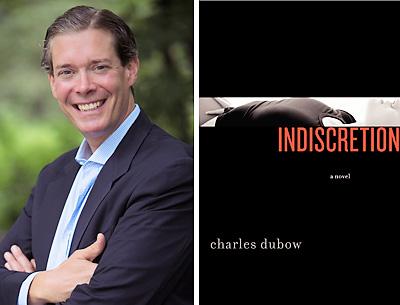Fortunate Son

“Indiscretion”
Charles Dubow
William Morrow, $25.99
There are no perfect lives. Even people who seem to have it all, whose births appear to have set them on a course that ensures success and happiness, even those fortunate few encounter trouble along the way. And does having it all invite being taken down a peg? Moreover, what if you have it all and still desire more? What then?
That is the object lesson and these are the questions one takes away from Charles Dubow’s debut novel, “Indiscretion.” Drawing heavily on the Georgica section of East Hampton for its setting provides an added dimension of reality for readers familiar with the East End of Long Island.
Harry and Madeleine Winslow would seem the ideal couple, leading charmed lives. They are bright, attractive, and accomplished. Harry is a National Book Award-winning author who was a star athlete at Yale, where he met and wooed the beautiful Maddy. Thanks to her family’s “old” money, the Winslows and their young son, Johnny, divide their time between a house on Georgica Pond and a brownstone on the Upper East Side of Manhattan (code, I believe, for “having it all”). They are the center of an adoring circle of friends, moving through life with relative ease and comfort.
Into this circle enters Claire, a young, ambitious woman whom we first encounter as the weekend date of a boorish hedge fund executive. Is there a reader alive who will be surprised that Claire sets her sights on the heroic Harry, or that a torrid affair between the two ensues on two continents? (Is the novel’s title not enough of a clue?)
Despite the utter predictability of events, the story is — somewhat unaccountably — compelling and unforgettable. Although the copy on the inside flap of the book jacket advertises it as an “irresistibly sensual page-turner,” such is not really the case. The build-up to the extramarital affair, and its consummation, take up slightly less than half of the novel. What follows is the real meat of the work — i.e., the aftermath of Harry’s “indiscretion.” Although the reviewer’s need to steer clear of “spoilers” prevents me from describing much of the content of the second half of the book, I will say that it is far less formulaic (and therefore far more interesting) than the first.
This is no “Is this just a summer thing, or will you call me in the city?” novel for the beach. It is not the germ of a TV mini-series titled “Privileged Rich People Behaving Badly.” It is, in fact, a genuine morality tale of our time and place.
The story’s narrator is Maddy’s lifelong friend, Walter Gervais, reminiscent of Nick Carraway in Fitzgerald’s “The Great Gatsby.” Unlike Nick, however, this particular narrator proves troublesome in a number of ways. For starters, he describes events that it is unlikely he knew about, even after the fact, as he claims. Moreover, until the latter part of the novel, Walter is far from likable. His glib tendency to drop references to the lifestyle of the rich and famous makes him smarmy and, somehow, not quite the real thing.
Although the story of the Winslows’ marriage, Walter’s affair with Claire, and the affair’s aftermath all maintain the reader’s interest consistently, the manner of its telling raises concerns. An author can either tell or show. This novel would have been stronger if there had been more showing. Too much of what we read is simply reported. There is far too little language of imagery. In a story that takes us to East Hampton, Manhattan, Rome, and Paris, we are left hungering for descriptions that appeal to the senses.
In the book’s final pages, the narrator describes a solitary visit to the back lawn of his Georgica home on an April evening, as strains of Verdi’s “La Traviata” pour out of the open windows: “The shadowy shapes of the trees rise up like old friends, rustling in the breeze. I love this somber fugue of colors, all the purples and silvers and blacks. The tree nearest me, maybe fifteen feet away, is well lit by the lights from the house. . . . I am struck by how tangled the boughs are yet at the same time how beautiful, the filigree impossible to follow. . . . How tall, how graceful, how noble are these trees, how long they took to grow so high and yet how easily they can fall.”
That is a succinct, thoughtful metaphor for what has filled the preceding pages. More such writing could only strengthen a solid story.
In a similar vein, Mr. Dubow appears to hold back when it comes to analysis or insight. Yet here too we know this is something he is capable of. Writing of Madeleine Winslow’s personal back story, he observes, “Like those born without money, those born without love want it all the more. It becomes the great solution, the answer to all problems.” That’s good stuff, reminiscent, in my view, of Fitzgerald’s iconic line, “Let me tell you about the very rich. They are different from you and me.”
Let us hope that in his next novel, Mr. Dubow will feel free to flex his writer’s muscles even as he exercises his evident storytelling skills.
A weekend resident of East Hampton, James I. Lader regularly contributes book reviews to The Star.
Charles Dubow spent many summers at his family’s house on Georgica Pond.
